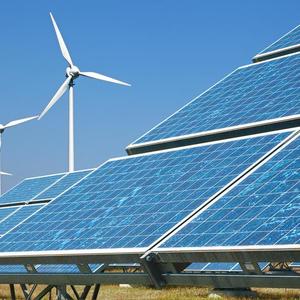Egypt’s largest private power utility and solar energy provider, KarmSolar, has raised a new round of funding to help with its plans to grow in the country and the region.
KarmSolar wants to lead the growth of the private solar energy market in Egypt by offering cutting-edge, integrated solutions for the industrial, agricultural, commercial, and tourism sectors.
Synergy Consulting, the US-based company, will act as the sell-side advisor for the new investment round. The money will be used to support existing power generation and distribution businesses as well as new ones, such as KarmWater, which provides solar water desalination solutions, and KarmCharge, an electric mobility business.
Through the minority stake sale, we are seeking a new partner to join KarmSolar’s current shareholders and its strategic shareholder, EDF Renouvelables, in supporting the next stage of our journey. “These are exciting times for the future of smart, connected utility platforms, and we plan to be at the forefront of this paradigm shift in our region,” said Ahmed Zahran, CEO and co-founder of KarmSolar.
How Did KarmSolar Become So Big In The Egyptian Energy Market?
One would think that a nation like Egypt would be ideal for solar energy given its population of over 90 million, ideal position, geography, and climate.
Although the country’s average annual solar radiation is between 2,000 and 3,200 kWh per square meter, solar energy is more of a myth than a reality in warm, sunny Egypt, which is on the edge of the African Sahara and nevertheless imports enough gas to power electricity-generating facilities everywhere.
Read: More African Countries To Enjoy Solar-Powered Internet From Tizeti
Things are starting to alter. In 2020, the Egyptian Ministry of Electricity and Energy hoped to meet 20% of the country’s demand for electricity using renewable sources. However, most comparable projects concentrated on wind energy as a power source rather than solar energy.
Egypt now only has one solar energy project, a 20 megawatt component of a 140 megawatt solar thermal and combined cycle power plant.
The only developer for a true solar project is KarmSolar, an Egyptian solar technology company focusing on environmentally friendly, economically viable, and sustainable energy solutions. KarmSolar is currently running its station off phase 1 of the Egyptian government’s Feed In Tariff (FiT) program. It is a 2.2 MW station in Hurghada, a tourist destination on the Red Sea, in Sahl Hashish.
KarmSolar was founded in 2011, one of the most troubled years in recent Egyptian history. Since then, it has become a leader in off-grid solar energy integration and the only supplier and developer of high-capacity solar pumping stations, especially for the agricultural industry.
After five years, KarmSolar (Arabic for “fruit-bearing vine”) has grown into new uses, including a patented technological innovation that enables the use of solar energy to pump water to farmlands at a quarter of the cost of currently utilized electricity-powered pumps.
KarmSolar’s chief executive officer and co-founder, Ahmed Zahran, claims: “While KarmSolar counts as the sole provider of solar energy in Egypt, we hate that status. We see the future of this, and we want more people in on it.”
Because of their unique “Maximum Power Point Tracking” algorithm, the company can cut the costs of designing, making, and building solar pumping drives by a lot.
Head of research and development for the business and additional co-founder, Randa Fahmy, states, “The end product was much costlier because we used to have the software and hardware components both imported; we now manufacture some of the components locally, which creates an easier entry point for clients.”
She also says, “Today, it’s easier for large organizations, SMEs, and even individual farmers to use solar water pumping solutions in a poor country where agriculture is the main source of income.”
Another company under the same name is KarmBuild, which focuses on designing and building buildings that are good for the environment and use energy efficiently.
Zahran says, “We started KarmBuild to make it the only company in the area to use solar energy technology in building design. We do this by using a wide range of materials that are good for the environment and by teaching architects how to build solar-powered buildings that are good for the environment.”
Zahran is hopeful about using the startup to create more off-grid environments, such as in agricultural or tourism-related communities, even though this may sound appealing in a region where “eco-friendly” doesn’t typically spring to mind in crowded, semi-industrial, business-oriented cities like Cairo. But when it comes to living off the grid, he has no illusions about places like Cairo or Alexandria.
“(These cities are) too crowded, too dependent on gas-powered electricity and too anti-change for anyone to try.” He goes on to say that his company’s work has cut about 22 tons of carbon dioxide in a country still debating how important it is to protect natural resources and reduce carbon emissions.
EFG-Hermes leasing has established a strategic relationship that effectively offers lease finance solutions for solar energy projects in Egypt, notably in smaller industrial and tourist areas, as KarmSolar and its subsidies seek to educate large sectors on moving off-grid.
Zahran says, “We have significantly lowered the cost, whether in going off-grid or building renewable energy-based projects. Whatever is done, solar energy is relatively expensive and at least much more expensive than government-subsidized gas-enabled power. The only solution was to get a major corporation like EFG-Hermes to go in and finance projects.”
He adds, “The barriers to renewable energy need to be broken, and solar energy must become accessible in a country that is, environmentally speaking, ideal for anything solar.”
With the startup’s belief in pushing solar-powered batteries that offer a 100% total payback on investment in less than 4 years, the goal is to have impoverished individual farmers and small workshops working on solar energy.
